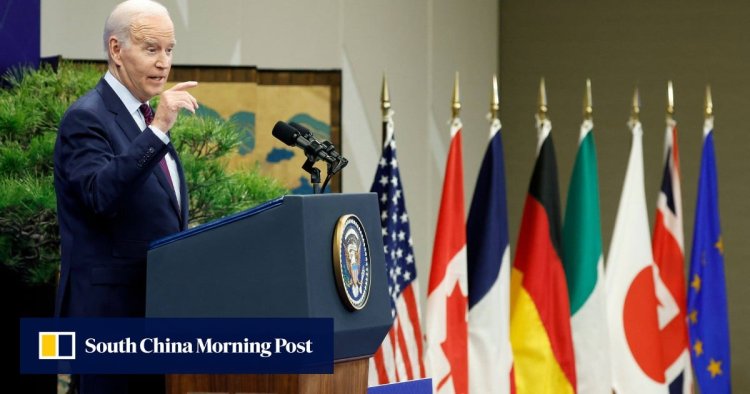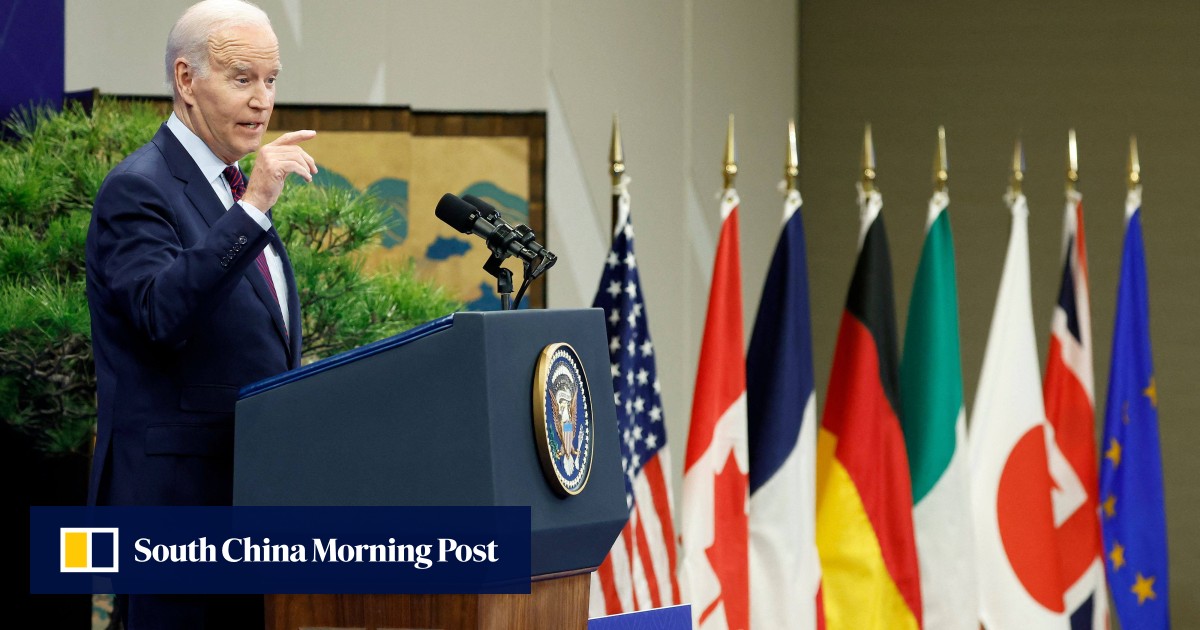G7 summit: Biden hits out at China’s ‘economic coercion’ but says thaw in ties may be on the way
2023.05.21 21:31Seven of the world’s wealthiest nations aim to diversify supply chains away from China and protect critical advanced technologies but are not about to decouple from the world’s second-biggest economy, US President Joe Biden said on Sunday.Speaking at the end of the Group of Seven summit in the Japanese city of Hiroshima, Biden said the G7 had a united position on China’s “economic coercion” – an accusation that Beijing denies.“We’re not looking to decouple from China. We’re looking to de-risk and diversify our relationship with China,” Biden said.“That means taking steps to diversify our supply chains and so we’re not dependent on any one country for necessary products.“It means resisting economic coercion.“Together, countering harmful practices that hurt our workers means protecting a narrow set of advanced technologies critical for our national security. And those elements are all agreed on by the G7.”China hit back at Biden’s claims, accusing the United States of unf


Seven of the world’s wealthiest nations aim to diversify supply chains away from China and protect critical advanced technologies but are not about to decouple from the world’s second-biggest economy, US President Joe Biden said on Sunday.
Speaking at the end of the Group of Seven summit in the Japanese city of Hiroshima, Biden said the G7 had a united position on China’s “economic coercion” – an accusation that Beijing denies.
“We’re not looking to decouple from China. We’re looking to de-risk and diversify our relationship with China,” Biden said.
“That means taking steps to diversify our supply chains and so we’re not dependent on any one country for necessary products.
“It means resisting economic coercion.
“Together, countering harmful practices that hurt our workers means protecting a narrow set of advanced technologies critical for our national security. And those elements are all agreed on by the G7.”
China hit back at Biden’s claims, accusing the United States of unfair practices.
“The United States has engaged in unilateral sanctions, ‘supply chain decoupling’, and weaponisation of economic and trade issues,” the Chinese embassy in Britain said.
“It is the real coercion.”
US and Japan seek to unite G7 against China. Should Beijing be worried?
The claims and counterclaims are the latest volleys in the China-US trade war that began in 2018 and led to tit-for-tat retaliatory tariffs imposed on a majority of export items.
The tensions have affected a wide range of sectors, particularly technology, with the US announcing a high-end chip ban in October and pressuring its allies to follow suit.
There were hopes the relationship would improve after Biden met Chinese President Xi Jinping in Bali in November but those efforts were undercut by the “spy balloon” saga in February.
On Sunday, Biden revived the possibility of improvement in ties, saying he expected a thaw in the frosty relations with China “shortly”.
US officials have also discussed meeting their Chinese counterparts, and Chinese Commerce Minister Wang Wentao is expected to visit the US to attend an Apec meeting next week.
Taiwan may pay ‘unthinkable’ price for free US weapons, says ex-minister
Biden also made it clear that Washington would maintain the status quo across the Taiwan Strait, underlining the US commitment to the one-China policy while continuing “to put Taiwan in a position that they can defend themselves”.
“Neither [China or Taiwan] territory can independently declare what they’re going to do, period,” he said.
“We made it clear that we don’t expect Taiwan to independently declare independence either.
“And there is clear understanding among most of our allies that in fact, if China were to act unilaterally, there would be a response.”
He also addressed the need to maintain stability in the South China Sea, a disputed waterway through which trillions of dollars in ship-borne commerce passes each year.
Biden’s message on China was echoed by British Prime Minister Rishi Sunak, who said China represented the world’s greatest challenge to security and prosperity, but other leading economies should not seek to fully decouple from it.
“With the G7, we are taking steps to prevent China from using economic coercion to interfere in the sovereign affairs of others,” Sunak said.
Still, at least one G7 leader sought to strike a more amiable tone.
German Chancellor Olaf Scholz said G7 members would ensure big investments in China continued even as they pared risky exposure to the economic powerhouse.
Speaking to German broadcaster ZDF on the sidelines of the Hiroshima summit, Scholz said supply chains and exports to China would also continue.
He said that while the countries wanted to limit their risk exposure, no one had an interest in curbing growth in China.
Additional reporting by Reuters
What's Your Reaction?













